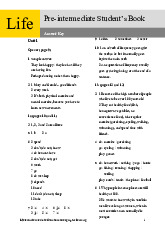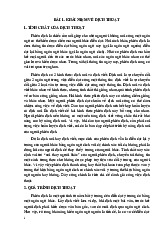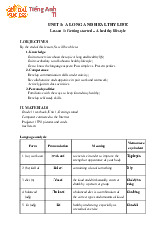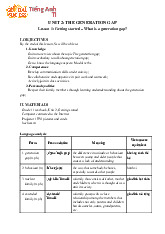





Preview text:
LESSON PLAN
TIẾNG ANH 11 FRIENDS GLOBAL UNIT 1: GENERATIONS
LESSON 1A- VOCABULARY: AGES AND STAGES I. OBJECTIVES
By the end of this lesson, Ss will be able to: 1. Knowledge
- Gain an overview about stages of life.
- Gain vocabulary to talk about different stages of lives. 2. Competences
- Develop communication skills and creativity.
- Be collaborative and supportive in pair work and teamwork.
- Actively join in class activities. 3. Personal qualities
- Understand the life events. - Develop self-study skills. II. MATERIALS
- Grade 11 textbook, Unit 1, Vocabulary
- Computer connected to the Internet
- Projector / TV/ pictures and cards
- Phần mềm tương tác sachso.vn Language analysis Form Pronunciation Meaning 1. centenarian (n)
/ˌsentɪˈneəriən/ a person who is 100 years old or more 2. split up (phr v) /splɪt ˈʌp /
to stop having a relationship with somebody 3. toddler (n) /ˈtɒdlə(r)/
a child who has only recently learnt to walk Assumption
Anticipated difficulties Solutions
- Encourage students to work in pairs and in groups so
Students are reluctant to work in
that they can help each other. groups.
- Provide feedback and help if necessary.
- Explain expectations for each task in detail.
- Continue to explain task expectations in small
chunks (before every activity).
Students may lack vocabulary to deliver - Provide vocabulary and useful language before a speech assigning tasks
- Encourage students to work in groups so that they can help each other. III. PROCEDURES 1. WARM-UP (5 mins) a. Objectives:
- Introduce the new lesson and set the scene for Ss to acquire new language.
- Get students' attention at the beginning of the class by means of enjoyable and short
activities as well as to engage them in the steps that followed. b. Content: - Riddle game. - Exercise 1. (p.12) c. Expected outcomes:
- Students can gain more confidence and interest in the lesson. d. Organisation
TEACHER’S AND STUDENTS’ ACTIVITIES CONTENTS RIDDLE GAME Answers: - Teacher shows the riddles. 1. an egg
- Ss work in 4 groups. Each group raise hands to take 2. no smoke(electric train)
turn and answer. The team gains bonus with every 3. a barber correct answer. 4. a chalkboard
- The team with highest points is the winner. 5. a secret 6. human being. e. Assessment
- Teacher observes the groups and give feedback.
2. ACTIVITY 1: PRESENTATION (4 mins) a. Objectives:
- To get students learn vocabulary related to the topic. b. Content:
- Pre-teach vocabulary related to the topic. c. Expected outcomes:
- Ss know how to pronounce the new words precisely and use them in appropriate contexts.. d. Organisation
TEACHER’S AND STUDENTS’ ACTIVITIES CONTENTS
Vocabulary pre-teaching New words:
- Teacher introduces the vocabulary. 1. centenarian (n)
- Teacher explains the meaning of the new vocabulary 2. split up (phr v) by pictures. 3. toddler (n)
- Teacher checks students’ understanding.
- Teacher reveals that these words will appear in the
reading text and asks students to open their textbook to discover further. e. Assessment
- Teacher checks students’ pronunciation and gives feedback.
- Teacher observes Ss’ writing of vocabulary on their notebooks.
3. ACTIVITY 2: PRACTICE (23 mins) a. Objectives:
- Ss can answer the questions to critical thinking.
- They can also finish the tasks in the textbook. b. Content: - Exercise 2. (p.12) - Exercise 3. (p.12) - Exercise 4. (p.12) - Exercise 5. (p.13) - Exercise 6. (p.13) c. Expected outcomes:
- Students can thoroughly understand the content of the text and complete the tasks successfully. d. Organisation
TEACHER’S AND STUDENTS’ ACTIVITIES CONTENTS
Exercise 2. Number the stages of life in the order that people reach them. Then listen and check.. (4 mins)
- T goes through the stages of life together and Answer key: check the meaning. 1 be an infant.
- Ss working in pairs, students put them in order. 2 be a toddler.
- T checks answers as a class. Point out that in 3 be a young child.
most countries, a person is legally an adult at 18. 4 be in your teens. 5 be an adult. 6 be in your twenties. 7 be middle-aged. 8 be elderly. 9 be a centenarian
Exercise 3. Match some of the phrases in exercise 2 with the pictures below of the woman
at different stages of her life. (4 mins)
- Students study the pictures. In pairs, they match Answer key:
the phrases with the pictures.
in picture A, she is an infant. in picture B, she is a - Check answers as a class
toddler. in picture C, she is a young child. in
picture D, she is a teenager. in picture E, she is in
her twenties. in picture F, she is middle-aged. in
picture G, she is elderly. in picture H, she is a centenarian
Exercise 4. Check the meaning of the life events below. At what age are they most likely to
happen, do you think? Put them in groups A–E. Compare your answers with your partner’s. Do you agree? (5 mins)
- Go through the meaning of the life events and Answer key: check their pronunciation.
A be born; be brought up (by); go to university;
- Focus attention on the groups A–E and ask
grow up; learn to drive; leave home; leave school;
students to decide in which periods of a person’s start school.
life the events are most likely to happen.
B buy a house or flat; get engaged; get married;
- In pairs, students put the events in the groups.
get your first job; settle down; split up; start a
Point out that some events can happen at more family than one period.
C get divorced; have a change of career; inherit - Check answers as a class
(money, a house, etc.); start a business
D become a grandparent; retire
E emigrate; fall in love; move house; pass away
Exercise 5. Listen to four people talking about their backgrounds and their families. Circle the
correct answers (a–c) (5 mins)
- Go through the instructions together. Tell students Answer key:
they do not have to understand every word of the 1 a 2 c 3 c 4 c
recording. They should listen for key words to get the gist.
- Play the recording for students to find the answers. - Check answers as a class.
Exercise 6. Complete the sentences with the past simple form of the verbs below. Then listen again and check. (5 mins)
- Revise the past simple by writing the following Answer key:
verbs on the board and asking students to come up 1 emigrated
and write their past simple forms: 2 didn’t leave; got.
• irregular verbs: think, become, catch, write, 3 grew up. sit, know. 4 bought.
• regular verbs: remember, invite, believe, 5 fell; got. ignore, marry, fit. 6 was; moved
- Go round the class and ask students to form 7 left; didn’t go
negative sentences and questions with the verbs on 8 started; didn’t retire the board.
- Students work individually to complete the sentences. - Check answers as a class. e. Assessment
- Teacher observation on Ss’ performance.
- Teacher’s feedback and peers’ feedback.
4. ACTIVITY 3: PRODUCTION (10 mins) a. Objectives:
- To help Ss practice speaking skills;
- To help Ss memorize the basic knowledge on stages of life. b. Content: - Role play - Exercise 7 (p13) c. Expected outcomes:
- Students can give a short talk about stages of life. d. Organisation
TEACHER’S AND STUDENTS’ ACTIVITIES CONTENTS
Exercise 7. Work in pairs. Ask and answer about your family and your ancestors. Give extra
information where you can. (10 mins) . Role play
- Revise the words for relatives by asking students to
Students’ own creativity.
brainstorm as many relatives as they can in one minute.
- Go through the questions together.
- Students discuss the questions in pairs. - Elicit a few answers.
- Ss have 5 minutes to prepare for the role play.
- Teacher invites 1 or 2 groups to come to the stage and do the role play.
- Teacher asks other groups to listen and give comments.
- Teacher gives feedback and give marks to the best group. e. Assessment
- Teacher observation on Ss’ performance.
- Teacher’s feedback and peers’ feedback. 5. CONSOLIDATION (3 mins) a. Wrap-up
- T asks Ss to talk about what they have learnt in the lesson. b. Homework - Prepare for the next lesson Board Plan Date of teaching
TIẾNG ANH 11 FRIENDS GLOBAL UNIT 1: GENERATIONS
LESSON 1A- VOCABULARY: AGES AND STAGES * Warm-up - Exercise 1 * Vocabulary 1. centenarian (n) 2. split up (phr v) 3. toddler (n) * Practice - Exercise 2 - Exercise 3 - Exercise 4 - Exercise 5 - Exercise 6 * Production - Exercise 7 *Homework




